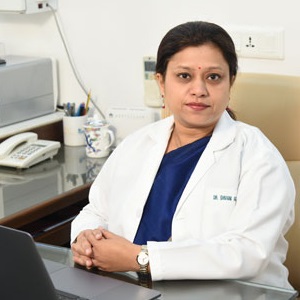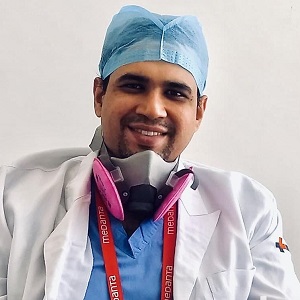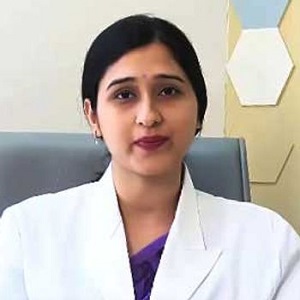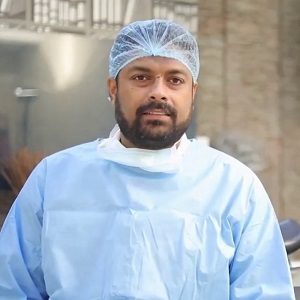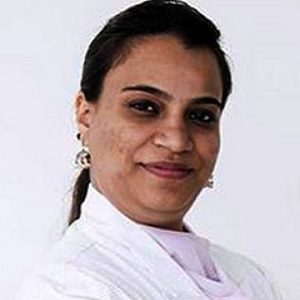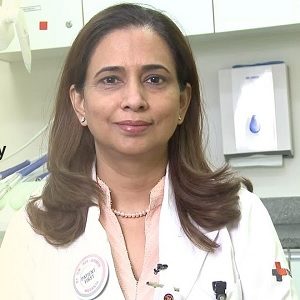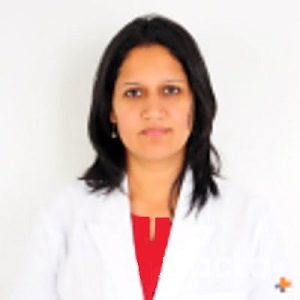Best Doctors in India for Gum Surgery
- Dentist and Dental Surgeon, New Delhi, India
- Over 21 years’ experience
Profile Highlights:
- Dr. Shivani Agarwal has over 21 years of experience in Endodontics.
- She has worked in some of the premier hospitals in Delhi including LNJP hospital and AIIMS. Presently, she is a full-time consultant at Apollo Hospitals in Delhi.
- Dr. Shivani Agarwal is trained in Aesthetic Dentistry from Buffalo University in USA.
- Dentist, Gurugram, India
- Over 10 years’ experience
Profile Highlights:
- Dr. Ankur Rustagi has over 10 years of specialized practice in Dental implants and Maxillofacial surgery.
- He was the first batch of students who pursued post-graduation in Oral & Maxillofacial Surgery from AIIMS, New Delhi.
- Dr. Rustagi has successfully treated over 5000 patients with simple and complex dental and implant requirements, jaw fractures, and orthognathic and TMJ problems.
- Dentist, Gurugram, India
- Over 10 years’ experience
Profile Highlights:
- Dr. Ateksha Bhardwaj is a dental surgeon who specializes in Cosmetic And Restorative Dentistry.
- She is an alumnus of King’s College, London from where she has successfully completed her Masters in Endodontics.
- She has a special interest in Restorative and Cosmetic Dentistry and has undergone various certification courses to restore teeth with the optimum aesthetic value from King’s College London.
- Dentist, Chennai, India
- Over 8 years’ experience
Profile Highlights:
- Dr. Fayeza Zaynab Quraishi is a young dentist in Chennai. Having worked in the field for more than eight years now, she is one of the best in the field of Dental Anti-Microbial Therapy, Dental Bone Grafting, and Dental Anti-Microbial Therapy.
- Patients visit her for Dental Crowns – Dental Cap, Anxious Patients Treating, Bad Breath Management, Apicoectomy, Ceramic Braces, Cavity Detection, and Conscious Sedation.
- Dentist, Chennai, India
- Over 14 years’ experience
Profile Highlights:
- Dr. Sanketh Reddy, one of the best young dentists in Chennai, is now a dental surgeon at Apollo Hospitals Chennai. He has more than 14 years of experience in the dental profession.
- As a result of his interest in Maxillofacial Prosthetics, Dr. Sanketh Reddy proceeded for his second Master’s degree from Mahidol University in Thailand.
- He also went through several diplomas and training to get a broad understanding of cutting-edge knowledge.
- Dentist, Gurugram, India
- Over 25 years’ experience
Profile Highlights:
- Dr. Vandana Sehgal is a renowned Dentist, who has more than 25 years of experience in treating Indian patients who are having dental problems.
- She has expert hands in Periodontology, Implantology, and General Dentistry.
- She is an eminent member of the Indian Dental Association and Academy of Oral Implantology.
- Dentist, Gurugram, India
- Over 23 years’ experience
Profile Highlights:
- Dr. Amrita Gogia presently heads the Department of Dental Sciences of Medanta- The Medicity, which has three branches in and around Delhi.
- She believes in regular up-gradation of her skills and knowledge. She is always up to date with her arena of Dentistry.
- Dr. Amrita Gogia believes in the line, ‘Prevention is better than cure’, and she has opened up the door to prophylactic procedures in Dentistry.
- Dentist, Gurugram, India
- Over 20 years’ experience
Profile Highlights:
- Dr. Ritu Sharma has a full-time experience of two decades in the area of Conservative Dentistry and Endodontics.
- Her tremendous efforts in Root Canal Treatment and surgery pushed her to be one of the best dental surgeons in India.
- She has extensive research papers related to Smile Design and Cosmetic Surgery, which has helped numerous patients get back to their regular stream of life.
Best Hospitals in India for Gum Surgery
Fortis Escorts Hospital, New Delhi
- City: New Delhi, India
Hospital Highlights:
- Over the last 33 years, the Fortis Escorts Heart Institute has set new standards in cardiac treatment with groundbreaking research. It is now known around the world as a centre of expertise for Cardiac Bypass Surgery, Interventional Cardiology, Non-invasive Cardiology, Paediatric Cardiology, and Paediatric Cardiac Surgery.
- The hospital has cutting-edge laboratories that perform a wide range of diagnostic tests in Nuclear Medicine, Radiology, Biochemistry, Haematology, Transfusion Medicine, and Microbiology.
- Fortis Escorts Heart Institute boasts a diverse group of bright and experienced doctors who are backed up by a team of highly qualified, experienced, and devoted support professionals as well as cutting-edge equipment such as the recently installed Dual CT Scan.
- Approximately 200 cardiac doctors and 1600 personnel currently collaborate to manage over 14,500 admissions and 7,200 emergency situations each year. The hospital now has a 310-bed infrastructure, as well as five cath labs and a slew of other world-class amenities.
Rela Hospital, Chennai
- City: Chennai, India
Hospital Highlights:
- RIMC is a multi-specialty hospital in a sprawling area of 36 acres located in Chromepet, Chennai, Tamil Nadu, India.
- The facility has 450 beds including 130 critical care beds, 9 operating rooms, modern reference laboratories and radiology services, and is conveniently located near road, rail and air transportation.
- RIMC is led and managed by world-renowned physicians committed to healthcare.
- RIMC offers the broadest range of clinical care, education, and research. The hospital offers state-of-the-art technology and modern treatment facilities designed to provide health care at an affordable cost.
- Rela Institute is driven by patient needs, comfort and confidence.
CARE Hospitals, Hyderabad
- City: Hyderabad, India
Hospital Highlights:
- CARE Hospitals were established in the year 2000, by CARE Group.
- The multispecialty hospital has 435 beds, including 120 critical care beds, with an annual inflow of 180000 outpatients and 16,000 in-patients.
- The hospital provides specialty medical services in Cardiology, Cardiothoracic Surgery, Pediatric Cardiology, Pediatric Cardiothoracic Surgery, Neurology, Neurosurgery, Nephrology, and Urology.
- The hospital has the first dual source, 128 slice CT scanner (for high precision cardiac imaging) – the first of its kind in south India.
- The hospital offers a wide range of accommodation facilities for the convenience of its varied patient base, ranging from general wards to super deluxe rooms.
Fortis Hiranandani Hospital, Mumbai
- City: Mumbai, India
Hospital Highlights:
- Fortis Hiranandani hospital was established in 2007.
- The hospital is an advanced tertiary care, multi-specialty hospital equipped with 149 beds.
- The hospital is equipped with a super ICU to provide emergency medical care to critically ill patients.
- The hospital is NABH accredited.
- The critical care facility in the hospital is augmented with the state-of-the-art facilities that facilitate speedier diagnosis and efficient monitoring.
- The hospital provides specialty medical services in cardiology, orthopedic science, pediatric science, neurology, diabetic care, urology, nephrology, ENT, obstetrics, gynecology, cosmetic surgery, bariatric surgery, neuro and spine care.
Fortis Hospital, Anandpur, Kolkata
- City: Kolkata, India
Hospital Highlights:
- Fortis Hospital, Anandapur, Kolkata is a world-class super-speciality equipped with the latest technologies in the medical world.
- The hospital is NABH accredited.
- This state-of-the-art facility specializes in cardiology and cardiac surgery, urology, nephrology, neurosciences, orthopaedics, digestive care, emergency care and critical care.
- The hospital, governed by integrated Building Management System (IBMS), has a pneumatic chute system, for quick vertical and horizontal transportation between floors, facilitating speedy transfer of patient specimens, documents, reports, and medicines to the concerned departments.
- The hospital also has a nephrology department with over 28 advanced dialysis units.
Fortis Hospital Banerghatta, Bengaluru
- City: Bengaluru, India
Hospital Highlights:
- Fortis Hospital Bannerghatta, Bengaluru was established in 2006.
- The hospital is a 276 bedded multi-specialty tertiary care facility.
- The hospital specializes in cutting-edge medical technology and dedicated patient care services.
- The hospital is equipped with state-of-the-art technologies like trans-radial angioplasty, trans-abdominal cardiac surgery, and computerized TKR navigation surgery.
- The hospital provides specialty medical services in cardiology, cardiac surgery, orthopedics, neurology, neuro-surgery, GI, and Minimal Access Surgery (MAS).
Gleneagles Global Hospital, Parel, Mumbai
- City: Mumbai, India
Hospital Highlights:
- Gleneagles Global Hospital The 450-bed facility comprises of 17-stories, housing state-of-the-art infrastructure, and advanced medical care facilities.
- The hospital offers end-to-end clinical, surgical, and diagnostic services. It is equipped with a team of eminent medical professionals aided by qualified nurses and medical staff
- The Hospital offers advanced Endoscopic procedures, Hepatobiliary and Liver Surgeries, Surgical and Medical Gastroenterology, Bariatric Surgery, and Robotic surgery.
- The hospital is a center of excellence for Orthopedics, Joint Replacement, Knee Replacement, and Hip Replacement surgery.
Manipal Hospital, Dwarka, Delhi
- City: New Delhi, India
Hospital Highlights:
- Manipal Hospitals, Dwarka, is a super-specialty hospital in Dwarka, New Delhi, which is a part of Manipal Hospitals Group.
- The hospital aims to provide the best treatment on par with international standards at a fraction of the cost.
- Equipped with 380 beds, the hospital is also one of the new age hospitals which are equipped fully with state-of-the-art infrastructure, cutting-edge technology as well as the latest and advanced clinical practices. The hospital also has 13 modular Operation theatres with 118 beds which are solely meant for critical care.
- The hospital comprises internationally acclaimed doctors and highly professional and experienced hospital and medical staff who are able to provide preventive, therapeutic, and diagnostic services all under one roof.
Paras Hospital, Gurugram
- City: Gurugram, India
Hospital Highlights:
- Paras hospital was established in 2006 and is the 250 bedded flagship hospital of Paras Healthcare.
- The is supported by a team of doctors of international and national repute.
- The hospital is NABH accredited and also the first hospital in the region to have a NABL accredited laboratory.
- The hospital provides specialty medical services in around 55 departments including Neurosciences, Joint Replacement, Mother & Child Care, Minimal Invasive Surgery, Gynecology and Obstetrics, Ophthalmology, Dermatology, Endocrinology, Rheumatology, Cosmetic and Plastic surgery.
- The hospital is equipped with state-of-the-art technologies.
W Pratiksha Hospital, Gurgaon
- City: Gurugram, India
Hospital Highlights:
- W Pratiksha Hospital, Gurugram, is one of the best hospitals in the NCR region. It is also a top hospital in India for IVF. Since its inception, the hospital has performed over 5500 successful IVFs. The hospital also specializes in gynecology.
- With over 20 years of experience in providing quality healthcare, the hospital is known as one of the most trusted and valued health providers in India.
- Equipped with world-class medical facilities and advanced technology, the hospital’s doctors and clinicians also have a track record of delivering excellent results. The hospital is also known for focusing on preventive well-being as much as on curative treatment.
- The hospital has earned the trust of its patients, by providing the best available treatments at affordable costs.
Gum Surgery
Gum surgery also termed as periodontal surgery, is performed for treating certain types of gum diseases and conditions like periodontitis and gingivitis.
This procedure is able to remove bacteria from beneath the gums, make it easier for you to clean your teeth, prevent any future damage of the gums and reshape the bones that support your teeth.
Purpose
People who are suffering from severe or any advanced form of disease around the gums can be candidates for this surgery. Symptoms of gum disease include:
- Deep pockets that form between your gums and teeth
- Gums that are swollen, red or bleeding
- Bad breath
- Loose teeth
- Pain when chewing
- Gums that recede or pull away from the teeth
You may also need this surgery if you have any gum diseases such as gingivitis and periodontitis.
Gingivitis is a mild form of gum disease which leads to swelling, bleeding and gum redness. Usually, gingivitis is a result of improper oral hygiene, plaque and tartar buildup. The condition can be reversed with the help of professional treatment.
When gingivitis gets worse and advanced, it leads to a more severe form of gum disease known as periodontitis. This condition leads to an inflammatory response that destroys the bones and tissues. This can cause tooth loss and bone damage.
Types
Gum Surgery is of different types and what type of surgery is performed will depend on the type of severity of your gum disease.
Flap surgery- This method is helpful for people having tartar deposits in deep pockets. The procedure involves lifting the gums off of the teeth so that the tartar buildup can be removed.
After the area is cleaned by the surgeon and he/she has removed the tartar, they will be stitching the gums to fit around the teeth. Sometimes, during the procedure, the bone might require reshaping.
Guided tissue regeneration- In this method, a dental surgeon places a tiny piece of mesh-like material between a person’s bone and gum tissue.
This material helps to prevent the gum from growing into space where bone should be. This allows the bone as well as the connective tissue to regrow.
Bone grafting- When the bone surrounding the root of the tooth is damaged, a bone graft might be required. This method involves replacing the damaged bone with a new one. This might be your own bone, a donated bone or an artificial one.
Tissue grafting- During this method, a dental surgeon will be removing tissue from one part of the body and re-attach it to another part where the gum has receded. The tissue generally comes from the roof of your mouth.
Preparation
Before you undergo gum surgery, a dentist will most likely need to perform a pre-operative exam for making sure that the surgery will be safe.
The dentist will likely:
- Take a review of your medical history and perform a few tests
- Check for any infections, abscesses, or any lesions that can make complicate the healing process
- Examine your teeth, mouth, and jaw to make sure you are healthy
- Discuss all risks and benefits of this surgery, and receive your consent to move forward with the procedure
Procedure
Gum surgery procedures generally take around 2 hours. It generally involves the following steps:
Sometimes, the surgery requires a person to be asleep, and therefore the dentist might use general anesthesia. At other times, the dentist might use a local anesthetic to numb the gums. The dentist will also use sterile equipment during the procedure, such as instruments and drapes, for lowering any risk of infection.
After he/she makes small incisions or cuts along the gum line, your dentist will lift the gums away from your teeth. This will allow your dentist to see the roots better. This will then allow him/her to remove and clean away any tartar, plaque, or infection.
After the deep cleaning is done, the dentist can perform any other procedures as required such as gum reshaping or bone regeneration.
Once the surgery is complete, your dentist will be stitching the gums back into their places. After around a week to ten days, the dentist will be able to remove the stitches.
Recovery
Your recovery generally depends on the severity of your disease, your overall health and the type of procedure that was performed. It is important to follow the instructions of your dentist quite carefully.
Like any other type of dental surgery, you might expect to have some minor bleeding and discomfort. After around 24 hours, you should be able to resume your normal routine.
Your dentist might ask you to refrain from smoking because it can interfere with the healing process. The longer you can avoid smoking after the surgery, the better it is for you. You might also be asked to use a special mouth rinse or take any antibiotic after the surgery. It is to be noted that you may not be able to brush or floss in certain areas of your mouth until they have healed. For a minimum of two weeks, it is recommended that you eat only soft foods.
Suitable foods include pasta, mashed potatoes, yogurt, cottage cheese, etc.
Risks
It is best to have a discussion with your dentist, regarding the risks, benefits and alternatives before you undergo the treatment.
The procedure is considered to be safe, though in few rare cases, there might be infections. After the procedure, people experience mild to moderate pain, which can be easily managed with medications. If moderate swelling occurs, you can talk to your dentist about it. He/she can give you more information regarding how you can handle any pain or swelling.

